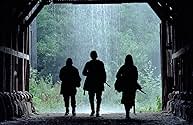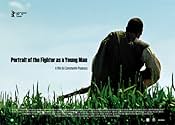Adicionar um enredo no seu idiomaThe story of anti-communist partisans in post-World War II Romania.The story of anti-communist partisans in post-World War II Romania.The story of anti-communist partisans in post-World War II Romania.
- Prêmios
- 3 vitórias e 5 indicações no total
Fotos
Dorian Boguta
- Rudan
- (as Doru Boguta)
Enredo
Você sabia?
- Versões alternativasFor the International release copy, there is an alternate version of 120 min, instead of the Romanian version, longer, the original one, which has 163 min
Avaliação em destaque
The story of the anticomunist brotherhood led by Mosu' Ogoranu hidding in Fagaras mountins is barely known even in Romania. The director himself declared in an interview that he did not intended a political movie. He said that he wrote and directed a movie about powerlessness and despair. Some say that the main characters are controversial, that they were part of the extreme right imprisioned by the extreme left that took over the power in the years after WWll. The history will clarify this at sometime and it looks like the movie does not care about this historical debate. I see in the movie only some dreamers that wanted to be free. A very long movie. A jouney takes time and this movie is about a life journey. Judging by the title chosed by the writer and director, the movie looks more like the journey of a young man through hard times. The story of Mosu and his friends journey, looping around some wild forest in Carathian mountins, preserving their free spirits serves this purpose perfectly. The story of the anticommunist fighters is just the perfect vehicle.
For few years the fighters are in permanent movement, hiding in deep forests, surviving heavy winters, manytimes encircled and as many times escaping. They are the hunted. It is a story about hunters and hunted, and maybe about haunted..The hunters are hideous figures of the secret services. But there is too much Securitate in this movie-an exces of badly made, too explicit scenes where people's lifes, will, freedom and bodies are violated. The hideous figures well played by Razvan Vasilescu and George Constantin were ugly enough so to make people understand what they did to many for many years. The kids friends of Militia and the two women field workers traitors are short well made portreits foreshodowing the moral degradation that will seize the whole society for many years.
Though, I think that the main caracter of the movie is hidden. Its presence is only felt in movie. The Father character is the central figure of the movie. And he takes few incarnations in the movie. The father is the Party and he is incarnated in every secret service leader. The speeches of the Securitate leaders played by great actors like George Constantin, Razvan Vasilescu are perfect display of a tyranical father, he is the only voice and will and everyone else is listening in perfect discipline. I bet not even the dogs are free to bark when he is around. He spreads despair and powerlessness. He uses any form of violence to impose his will.
Stalin, the dictator, was named the Father by the east European people. For many freedom lovers the only way was to cross the state borders. The fighters of brotherhood escape for years from the traps made by the party hidding in the deep mountain forest. And until the end they refused to cross the borders like there is nothing else beyond. Life is only the fight and the hope till the end. I think in this movie the forrest is a metaphor for a refuge used by the unconscious when an authoritarian figure shadows everything.
The film has intresting scenes like the one when the fighters manifest their joy when "father" Stalin dies. It reminds my of the joy of the jews escaping on the roof of their train in "Train de vie" by Radu Mihaileanu. The brotherhood of Ogoranu hearing the news of the dictator death, deep hiden in their hole dug in the forest floor under the trees does not manifest a wholly joy, they act immature, singing just like some boys around a fire in the summer camp. The scene could have been better made, could have been the centre of the movie.
The freedom, peace and joy are felt only among friends and expresed in the movie in the black and white film in film scenes, like dreaming scenes, these are the only moments when the young men are truly happy together. The friends figures: the biology teacher, the peasant, Leu, they are all just touches of brush painting one portreit, the portreit of the artist looking for escape, for freedom.
It is a movie about young life dreaming for freedom and escaping an authority that never weakens. In the story, the main figure was the longest and only surviver, he manage to escape free till the end of the hard years of the opression. In the end, through the citings from Ogoranu' memories, and maybe the artist' oath the legacy is that the freedom is a commitment the ones that will choose to think freely make, despite the times and the many profiteers. The film is made like the actors are playing in the camp around the fire, they look like they feel great in that great nature picture but they act like they are just in a camp trip, never melting in the background, even after many years with the nature as the only shelter. The real fighters must have survived the heavy winters only well knowing and living with the mountains. Definitely not a historical movie. History is just a pretext.
For few years the fighters are in permanent movement, hiding in deep forests, surviving heavy winters, manytimes encircled and as many times escaping. They are the hunted. It is a story about hunters and hunted, and maybe about haunted..The hunters are hideous figures of the secret services. But there is too much Securitate in this movie-an exces of badly made, too explicit scenes where people's lifes, will, freedom and bodies are violated. The hideous figures well played by Razvan Vasilescu and George Constantin were ugly enough so to make people understand what they did to many for many years. The kids friends of Militia and the two women field workers traitors are short well made portreits foreshodowing the moral degradation that will seize the whole society for many years.
Though, I think that the main caracter of the movie is hidden. Its presence is only felt in movie. The Father character is the central figure of the movie. And he takes few incarnations in the movie. The father is the Party and he is incarnated in every secret service leader. The speeches of the Securitate leaders played by great actors like George Constantin, Razvan Vasilescu are perfect display of a tyranical father, he is the only voice and will and everyone else is listening in perfect discipline. I bet not even the dogs are free to bark when he is around. He spreads despair and powerlessness. He uses any form of violence to impose his will.
Stalin, the dictator, was named the Father by the east European people. For many freedom lovers the only way was to cross the state borders. The fighters of brotherhood escape for years from the traps made by the party hidding in the deep mountain forest. And until the end they refused to cross the borders like there is nothing else beyond. Life is only the fight and the hope till the end. I think in this movie the forrest is a metaphor for a refuge used by the unconscious when an authoritarian figure shadows everything.
The film has intresting scenes like the one when the fighters manifest their joy when "father" Stalin dies. It reminds my of the joy of the jews escaping on the roof of their train in "Train de vie" by Radu Mihaileanu. The brotherhood of Ogoranu hearing the news of the dictator death, deep hiden in their hole dug in the forest floor under the trees does not manifest a wholly joy, they act immature, singing just like some boys around a fire in the summer camp. The scene could have been better made, could have been the centre of the movie.
The freedom, peace and joy are felt only among friends and expresed in the movie in the black and white film in film scenes, like dreaming scenes, these are the only moments when the young men are truly happy together. The friends figures: the biology teacher, the peasant, Leu, they are all just touches of brush painting one portreit, the portreit of the artist looking for escape, for freedom.
It is a movie about young life dreaming for freedom and escaping an authority that never weakens. In the story, the main figure was the longest and only surviver, he manage to escape free till the end of the hard years of the opression. In the end, through the citings from Ogoranu' memories, and maybe the artist' oath the legacy is that the freedom is a commitment the ones that will choose to think freely make, despite the times and the many profiteers. The film is made like the actors are playing in the camp around the fire, they look like they feel great in that great nature picture but they act like they are just in a camp trip, never melting in the background, even after many years with the nature as the only shelter. The real fighters must have survived the heavy winters only well knowing and living with the mountains. Definitely not a historical movie. History is just a pretext.
- danidln
- 13 de out. de 2023
- Link permanente
Principais escolhas
Faça login para avaliar e ver a lista de recomendações personalizadas
Detalhes
- Data de lançamento
- País de origem
- Idioma
- Também conhecido como
- Portrait of the Fighter as a Young Man
- Locações de filme
- Empresa de produção
- Consulte mais créditos da empresa na IMDbPro
Bilheteria
- Orçamento
- € 800.000 (estimativa)
- Faturamento bruto mundial
- US$ 13.314
- Tempo de duração2 horas 43 minutos
- Cor
- Proporção
- 2.35 : 1
Contribua para esta página
Sugerir uma alteração ou adicionar conteúdo ausente

Principal brecha
By what name was Portretul luptatorului la tinerete (2010) officially released in India in English?
Responda












